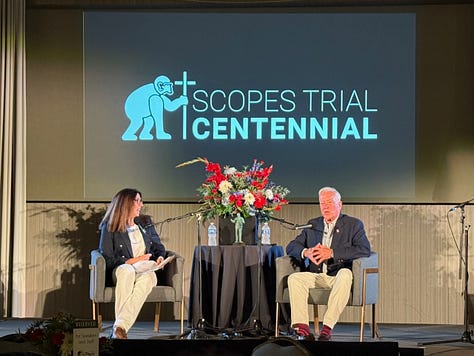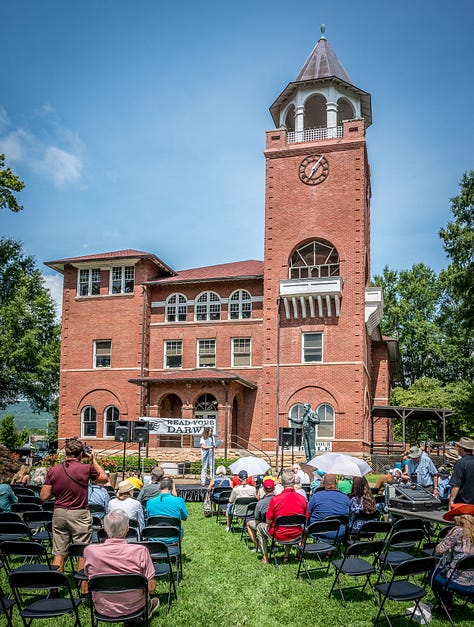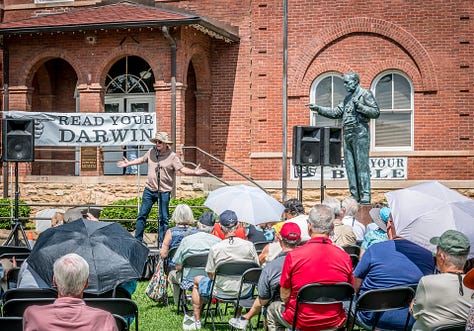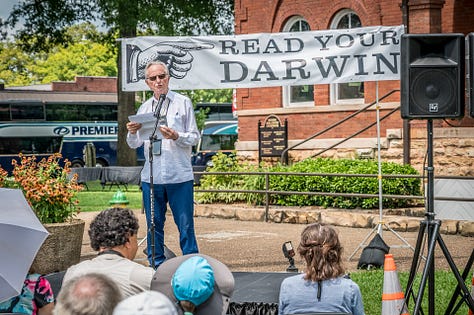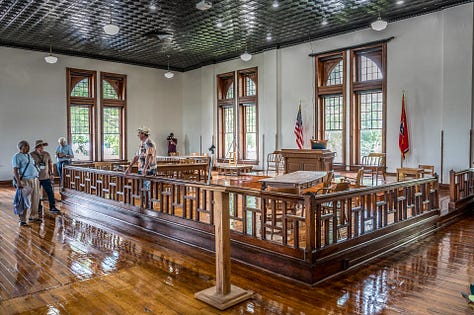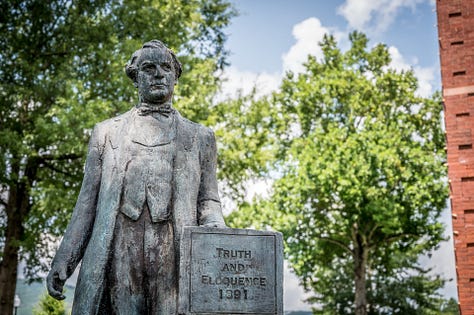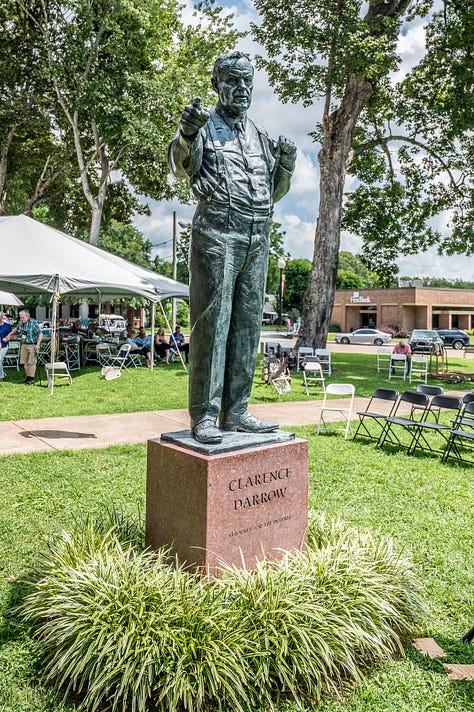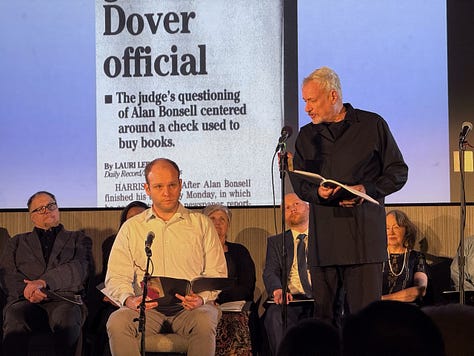July marked 100 hundred years since the landmark Scopes Monkey Trial put the teaching of evolution on trial in a small Tennessee courtroom, yet the battle over science education in America is far from over. The Scopes Trial in 1925 was a turning point in the national debate over evolution and public education. Eighty years later in 2005, the Dover Panda Trial was another landmark case, this time establishing that intelligent design is not science and cannot be taught in public schools. Today alarming legal and legislative developments threaten to roll back decades of progress.
Scopes Monkey Trial
The Scopes Monkey Trial has long been seen as an attempt to bring light to the darkness of entrenched religious ignorance. The reality is just the opposite. The case was more the extinguishing of the light of truth. It was an attempt by Christian fundamentalists to remove all mention of evolution from public education.
Most Americans’ understanding of the Scopes Trial comes from a fictionalized version, the play Inherit the Wind. While that story captured the courtroom drama largely right, it stood the entire history of the case on its head. Viewers come away with the impression that Scopes was trying to bring evolution to high school students.
But the evolutionary theory that John Scopes was teaching was not novel to the curriculum. In fact, he was teaching out of the state’s required text book. The Butler Act, which outlawed the teaching of evolution, had passed the state legislature only a few months prior. Local leaders thought a trial testing the law would bring publicity to the town of Dayton, and they recruited Scopes to be the defendant. Scopes was a math and science teacher, but had substituted in the biology class where he may have taught evolution–it is not clear that he actually did violate the law. Scopes encouraged students to testify against him, and coached them what to say to get the grand jury indictment.
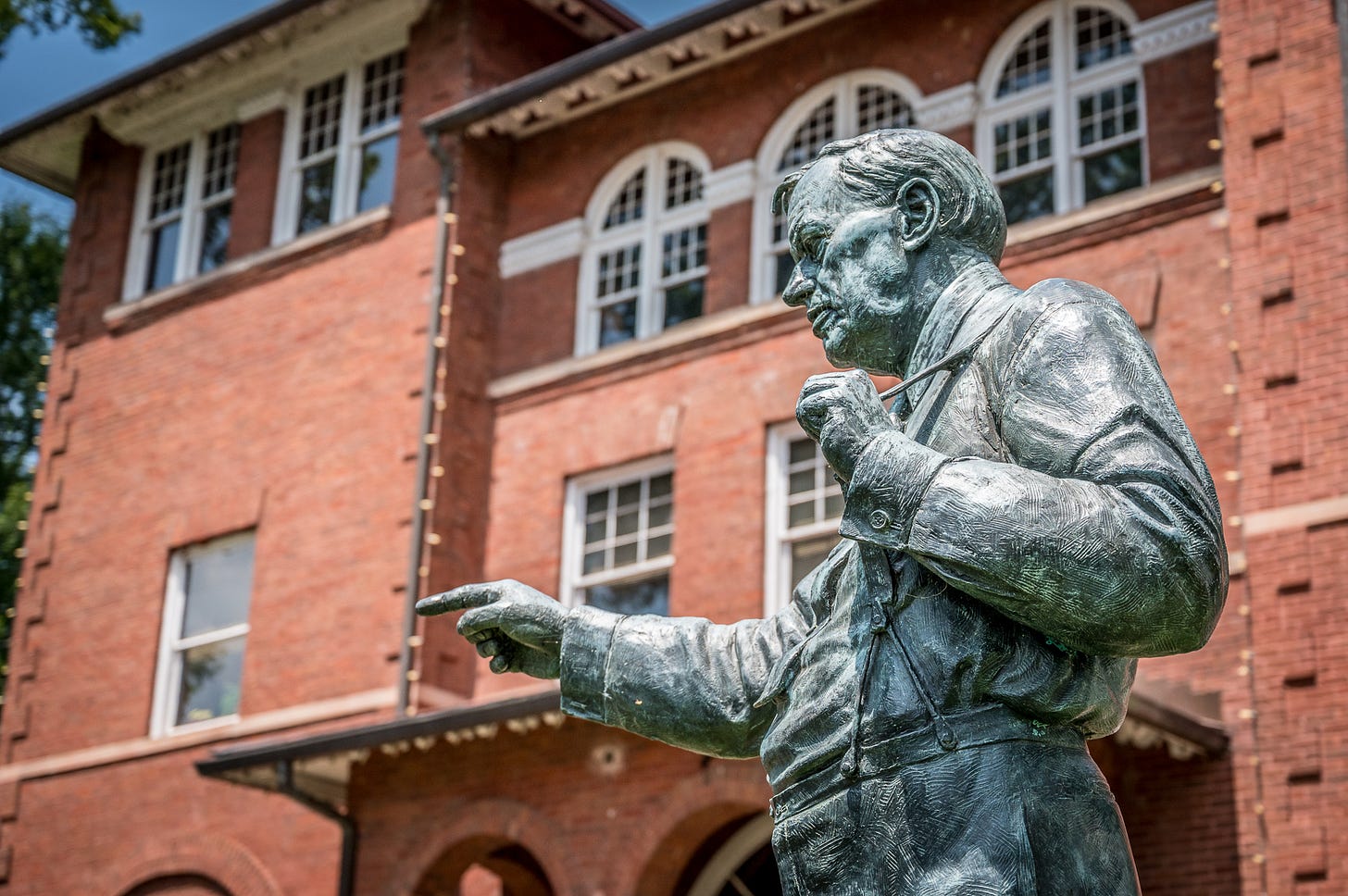
Part of what made the case such a spectacle was the attorneys arguing the case. William Jennings Bryan, a 3-time Democratic presidential nominee, was a Christian fundamentalist who argued that all of the country’s problems could be traced to a lack of religious faith. He gladly signed on to prosecute the case. Famed lawyer and outspoken agnostic, Clarence Darrow volunteered to defend Scopes. The trial was front-page news across the country.
Darrow wanted to call experts to provide scientific evidence in favor of evolution and against the biblical account of creation, but the trial judge ruled against them. Since the judge ruled that scientific testimony about the bible was irrelevant, Darrow took the extraordinary step of calling Bryan to the stand to testify as a bible expert. This led to two hours of sparring between Bryan and Darrow over questions such as, “Where did Cain’s wife come from?” While the exchange was the dramatic climax of the trial, as portrayed in Inherit the Wind, it actually had no impact on the outcome. The judge ruled the entire exchange irrelevant and instructed the jury to disregard. In the end, the defense chose not to provide a closing statement because, having been prevented from presenting their evidence, they agreed that there was only one conclusion the jury could reach–guilty. And so it was.
They intended to press the case on appeal, but the state supreme court sidestepped the main issue. They vacated the conviction on a technicality–the judge, not the jury, had set the fine at $100 as prescribed by the law, but judges were allowed to assess fines only up to $50. The state’s attorney declined to retry the case, so the merits of the case could not be appealed, and the Butler Act was upheld.
At the time of the Scopes trial, only Tennessee, Kentucky, Oklahoma, and (of course) South Carolina had anti-evolution laws. But national attention prompted a surge of similar legislation across the country. While most proposals failed, Mississippi and Arkansas enacted bans. The chilling effect was lasting—most biology textbooks avoided discussing evolution for decades.
Then came Sputnik. The Soviet Union’s 1957 satellite launch sparked the space race as well as a panic over the state of American education. Overnight, learning calculus became a patriotic duty. The 1958 National Defense Education Act led to the creation of new textbooks, written by scientists, emphasizing the importance of evolution as a unifying principle of biology. Even then, the fight over teaching evolution in public schools continued until 1968 when the Supreme Court ruled in Epperson v. Arkansas that laws prohibiting the teaching of evolution violated the Establishment Clause of the First Amendment.
Dover Panda Trial
Religious fundamentalists are a persistent lot, and the Supreme Court ruling forced them to find a new tactic. Rather than banning the teaching of evolution, they would try to force their religion into the school curriculum in other ways, inventing “Creation Science” and then a new theory they labeled “Intelligent Design”. School board elections matter, and in 2002 a group of Christian fundamentalists got elected to the Dover, Pennsylvania school board and started trying to get creationism added to the biology curriculum.
In 2004 the high school needed the board's approval to purchase new textbooks, but board members objected to the proposed books written by Kenneth R. Miller and others. Board member Bill Buckingham objected, saying the Miller book was "laced with Darwinism" and saying it was "inexcusable to have a book that says man descended from apes with nothing to counterbalance it." The controversy at the school board made local newspapers and caught the attention of staff at the Discovery Institute, a Seattle based “think tank” that pushes intelligent design and promotes “teach the controversy” as a way to sneak religion into our schools.
Staff from the Discovery Institute reached out to the Dover school board and helpfully suggested they stop talking about “creationism” and start talking about intelligent design. In addition to persistence Christian nationalists, fundamentalist or otherwise, are an organized and well-funded lot. The Discovery Institute connected the Dover school board with the Thomas More Law Center, a Christian, conservative, nonprofit, public interest law firm, established by the founder of Domino’s Pizza. They provided attorney Richard Thompson to advise and defend the school board. And Thompson recommended Of Pandas and People, a bullshit, psuedo-science text that argues that life shows evidence of being designed by an intelligent agent. The book takes pains not to say that that intelligent agent is god, but it is understood by its authors and proponents that that agent is the Christian god.
In November 2004, the Dover school board voted to require 9th grade biology teachers to read a statement to students that included the following:
Because Darwin's Theory is a theory, it is still being tested as new evidence is discovered. The Theory is not a fact. Gaps in the Theory exist for which there is no evidence. A theory is defined as a well-tested explanation that unifies a broad range of observations.
Intelligent design is an explanation of the origin of life that differs from Darwin's view. The reference book Of Pandas and People, is available for students to see if they would like to explore this view in an effort to gain an understanding of what intelligent design actually involves.
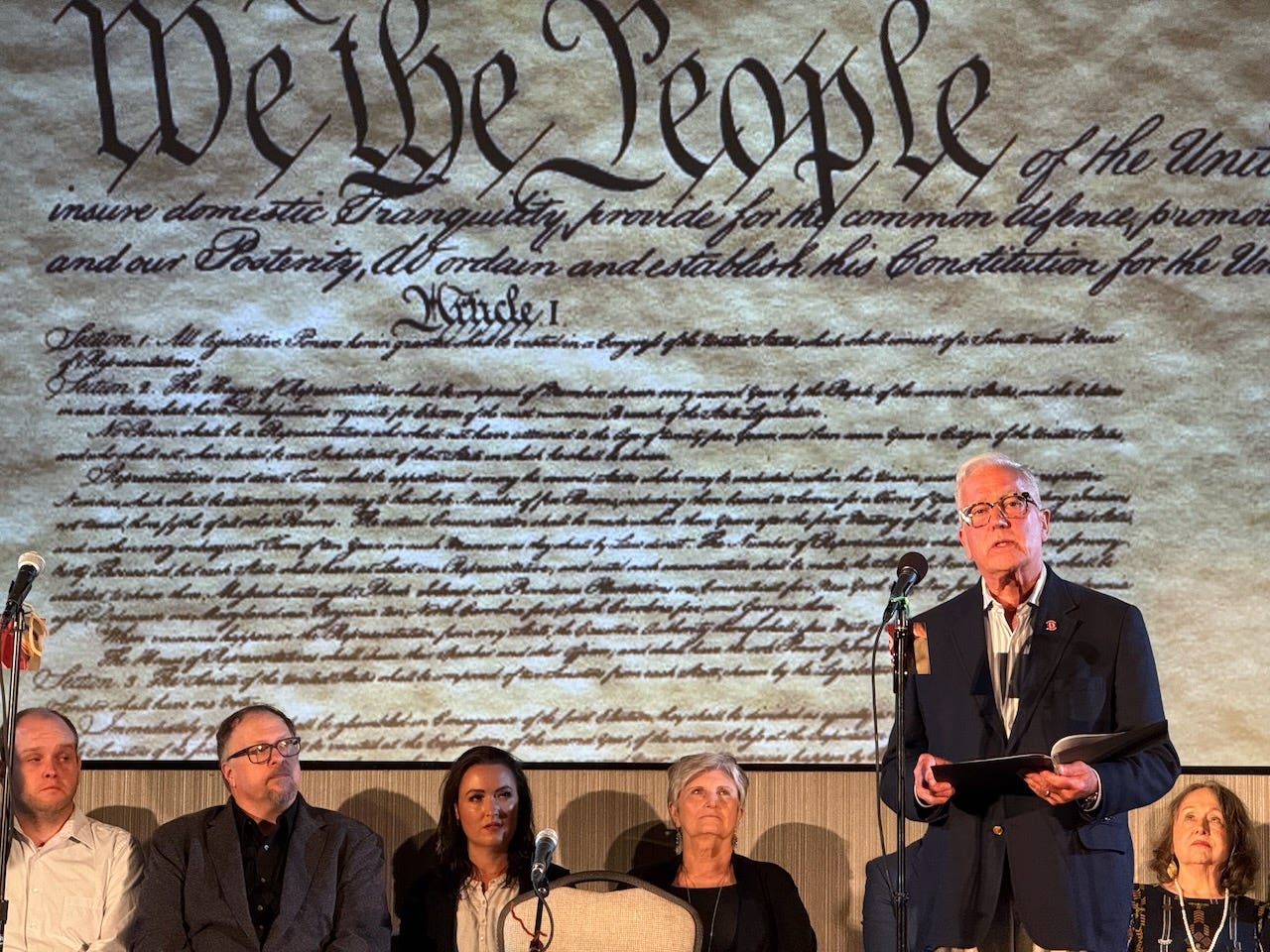
The ACLU sued, and in September 2005, Kitzmiller v. Dover Area School District, or The Dover Panda Trial, commenced. Because the trial was for an injunction against the school board, it was a bench trial, presided over by John E. Jones, III, a lifelong republican appointed to the bench by George W. Bush in 2002. Many assumed that his political affiliation would advantage the defense. But Judge Jones took his duties to the law and to the truth seriously, and unlike in the Scopes trial, the experts were allowed to give evidence. In particular Kenneth Miller, author of the biology text book favored by the biology teachers, was able to give detailed testimony of the evidence for evolution.
The defense had their own experts to testify, including Michael Behe, author of the best selling Darwin’s Black Box, which introduced the idea of irreducible complexity as a challenge to evolutionary theory. But Behe did not come prepared and was utterly demolished on the witness stand.
On December 20, 2005, Judge Jones issued a 139-page decision that ruled that intelligent design is not science, and that teaching it as an alternative to evolution is unconstitutional intrusion of religion in public schools. Importantly, this ruling was issued after the November election, in which 8 of the 9 members of the Dover school board were up for re-election. All 8 were turned out of office in favor of a slate of candidates who opposed teaching intelligent design. Before the judge issued his ruling, the people issued theirs. In this episode of history, science won out over bad faith.
Epilogue
The fight between light and darkness never ends, and as the Scopes trial demonstrates, the good guys don’t always win. Progress is not irreversible. On June 27, 2025, the Supreme Court issued a 6–3 ruling in Mahmoud v. Taylor, affirming that parents may opt their children out of school lessons involving LGBTQIA+ themes if those lessons conflict with religious beliefs. This ruling ignored prior evidence—such as in Montgomery County, Maryland—that opt-outs are often unworkable in practice. The decision paves the way for parents to demand opt-outs from any material that conflicts with their religion, including basic biology lessons on evolution.
In recent years, several U.S. states have introduced bills seeking to undermine evolution education. Some, like Louisiana and Tennessee, have enacted laws encouraging teachers to “critique” evolution by presenting its supposed “strengths and weaknesses.” Other bills in states such as Florida, Colorado, and Montana have so far failed but reflect the ongoing effort to erode science education.
With a conservative supermajority on the Supreme Court, the threat to truth is real.
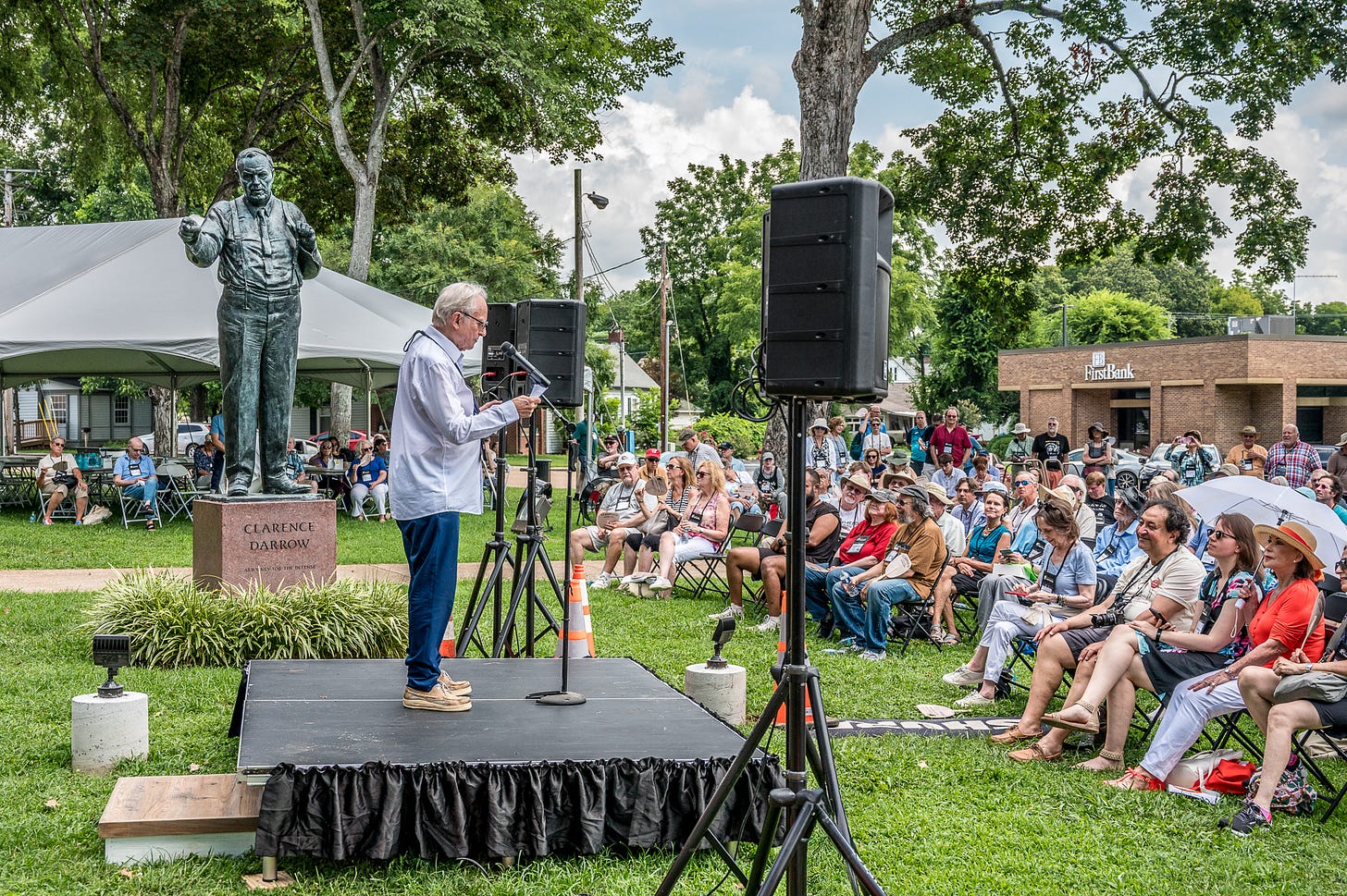
Conference Report
The Scopes Trial Centennial conference, jointly organized by the Freedom From Religion Foundation and the Center for Inquiry, was held in Chattanooga, Tennessee and Dayton Tennessee from 18-20 July, 2025. Thanks to the support of the SHL Conference Fund, I was able to participate in the conference. The conference included presentations from multiple authors of books on the Scopes trial, as well the presentation of the Defender of the Constitution Award to Judge John E. Jones, III, who presided over the Dover panda trial. His perspective on the trail and comments on the current state of jurisprudence in America was a highlight of the conference. The second day of the conference concluded with the performance of the audioplay “The Dover Panda Trial", written by actor and playwright John de Lancie (best known for portraying Q in multiple Star Trek series) and co-written by Kristen Tregar. The audioplay was performed by de Lancie and a troupe of local actors, with Judge Jones capping off the performance by reading an excerpt from his ruling. On the last day of the conference we bussed from Chattanooga to Dayton and toured the Rhea County Courthouse, site of the Scopes trial.
